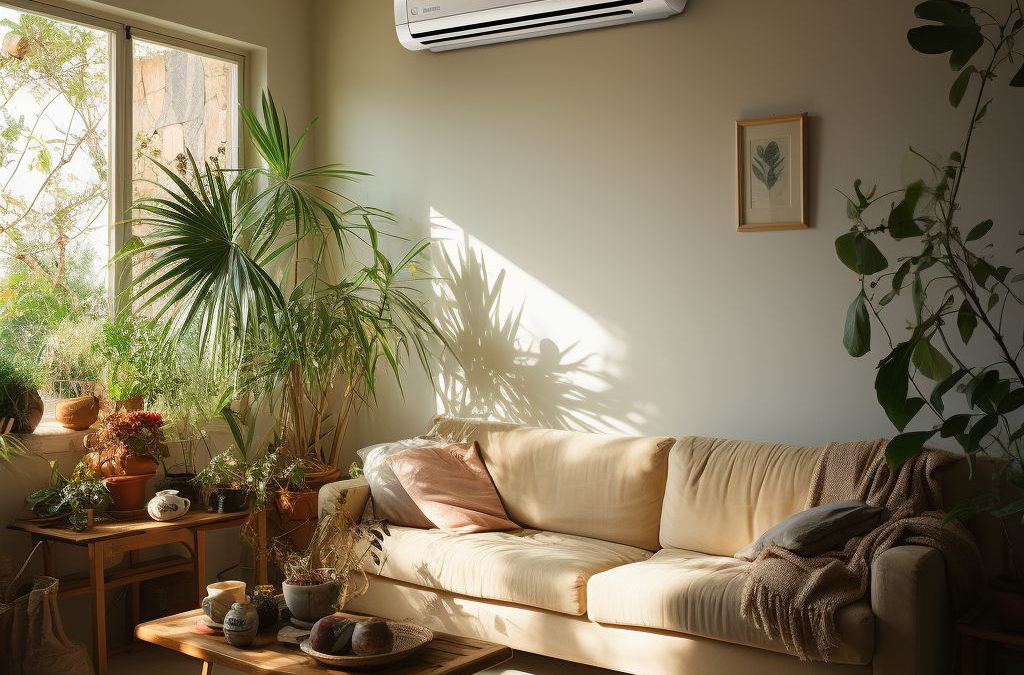As the summer heat continues to rise, it’s no wonder we all rely heavily on our trusty AC to keep us comfortable. However, with constant use, our air conditioning system can become less efficient, leading to skyrocketing energy bills and an uncomfortably warm home. Luckily, there are several ways to make your AC more efficient and effective, ensuring a cool and comfortable living space while saving money on your energy bills. Whether you’re a homeowner or a renter, these tips will help you optimize your AC unit’s performance and achieve maximum comfort. So, let’s dive in and discover the secrets to making your AC more efficient!
Tabe of Contents
- 1. Check and Clean Air Filters Regularly for Improved Airflow and Efficiency in Your AC
- 2. Install a Programmable Thermostat to Regulate Temperatures and Save Energy Costs
- 3. Inspect, Seal and Insulate Your Home for Reduced Heat Loss and Increased Cooling Efficiency
- 4. Consider Upgrading to a High-Efficiency AC Unit for Optimal Performance and Energy Savings
- 5. Keep Up with Annual Maintenance of Your AC System to Ensure Peak Efficiency and Longevity
- People Also Ask:
- Conclusion:
1. Check and Clean Air Filters Regularly for Improved Airflow and Efficiency in Your AC
Regularly checking and cleaning your AC air filters is essential to ensure optimal airflow and efficiency. Dirty air filters can cause your AC system to work harder than necessary, which can lead to higher energy consumption and increased costs. Dirty filters can also reduce the quality of the air you and your family breathe indoors.
How Often Should Air Filters be Cleaned?
The frequency of cleaning air filters depends on factors such as the type of filter, the indoor air quality, and the usage of your AC system. However, as a general rule, it is recommended that air filters are checked and cleaned or replaced at least once every 1-3 months.
How to Clean Air Filters of Your AC?
Cleaning air filters is a simple process that can be done at home following these steps:
- Turn off your AC system and locate the air filters.
- Remove the air filters carefully and inspect them for dirt and debris.
- If the filters are dirty, use a vacuum cleaner or a soft brush to remove the debris gently.
- If the filters are excessively dirty and cannot be cleaned, it’s time to replace them.
- Once the filters are clean, reinstall them in the AC system.
By checking and cleaning your AC air filters regularly, you can keep your AC system running optimally, improve indoor air quality, and save on energy costs.
2. Install a Programmable Thermostat to Regulate Temperatures and Save Energy Costs
A programmable thermostat is one of the most effective ways to regulate the temperatures in your home and save energy costs. This device allows you to set different temperature preferences throughout the day, based on your schedule. For example, you can set the temperature to be cooler during the day when the house is empty and warmer at night when everyone is sleeping.
How Does a Programmable Thermostat Work?
A programmable thermostat works by allowing you to set a schedule for your HVAC system. You can customize the settings by day of the week, time of day, and even room temperature. For example, you could set the temperature to be 72 degrees Fahrenheit during the day and 68 degrees Fahrenheit at night. This means that your air conditioning system won’t work as hard during the day when nobody is home, which can save you money on your energy bills.
Benefits of Installing a Programmable Thermostat
There are many benefits to installing a programmable thermostat in your home. One of the biggest advantages is the ability to save money on your energy bills. By using a programmable thermostat, you can reduce the energy consumption in your home when you’re not there or when you’re asleep. This means that you won’t need to run your air conditioning system as often or as long, which can help you save money on your utility bills. Additionally, a programmable thermostat can help you create a more comfortable environment in your home. By adjusting the temperature based on your schedule, you can ensure that your home is always at the perfect temperature, no matter what time of day it is.
Overall, installing a programmable thermostat is an excellent way to save energy, reduce your utility bills, and create a more comfortable environment in your home. With a little bit of planning and customized settings, you can ensure that your HVAC system is operating efficiently and effectively.
3. Inspect, Seal and Insulate Your Home for Reduced Heat Loss and Increased Cooling Efficiency
One of the most effective ways to make your AC more efficient is by inspecting, sealing, and insulating your home. This helps to reduce heat loss and increase cooling efficiency, ensuring that your air conditioner doesn’t have to work harder than necessary to keep your home cool. Here’s what you need to know.
Firstly, inspect your home for air leaks around windows, doors, and other openings. Use weatherstripping or caulking to seal any gaps and prevent cool air from escaping. You should also make sure that your ductwork is properly sealed and insulated, as leaking ducts can reduce cooling efficiency by up to 30%.
Next, ensure that your home is properly insulated. Attics and walls are major sources of heat gain and loss, so adding insulation here can have a significant impact on your AC’s efficiency. Use insulation with a high R-value (a measure of thermal resistance) to get the best results.
Lastly, consider installing reflective window film to reduce solar heat gain through your windows. This can be particularly effective for south and west-facing windows that receive the most sun exposure. By reducing heat gain, you can reduce the workload on your AC and make it more efficient.
Making these changes to your home not only helps to improve your AC’s efficiency, but it can also save you money on your energy bills. So take the time to inspect, seal, and insulate your home, and enjoy a cooler, more efficient living space.
4. Consider Upgrading to a High-Efficiency AC Unit for Optimal Performance and Energy Savings
Upgrading to a high-efficiency AC unit can provide optimal performance and energy savings for your home.
Benefits of High-Efficiency AC Units
Choosing a high-efficiency AC unit can provide several benefits for your home. These units typically have a higher SEER (Seasonal Energy Efficiency Ratio) rating, meaning they use less energy to cool your home. This translates into lower energy bills and reduced carbon emissions. Additionally, high-efficiency AC units often come with better warranties, quieter operation, and improved indoor air quality.
Factors to Consider When Choosing a High-Efficiency AC Unit
When you’re considering upgrading to a high-efficiency AC unit, there are several factors to consider. These include the size of your home, the climate in your region, and your budget. It’s important to choose a unit that’s the right size for your home to ensure optimal performance and energy savings. Additionally, your local HVAC contractor can help you determine the best SEER rating based on your specific needs and budget.
Installation and Maintenance
Once you’ve chosen a high-efficiency AC unit, it’s important to have it installed by a professional HVAC contractor. Proper installation is critical to ensuring optimal performance and efficiency. Additionally, regular maintenance is important to keep your unit running at peak efficiency. Schedule annual maintenance with your local HVAC contractor to ensure your high-efficiency AC unit continues to provide optimal performance and energy savings for years to come.
5. Keep Up with Annual Maintenance of Your AC System to Ensure Peak Efficiency and Longevity
.
Maintaining your AC system is crucial for ensuring optimal cooling efficiency and a long-lasting unit. An annual check-up by a qualified technician can identify potential problems, prevent breakdowns, and extend the lifespan of your system. Here are some tips for keeping up with annual maintenance.
Schedule Annual Professional Maintenance
Schedule an annual inspection and maintenance check-up with a licensed professional HVAC technician to ensure your system is running smoothly. Annual maintenance includes cleaning of the evaporator and condenser coils, checking refrigerant levels, tightening electrical connections, lubricating moving parts, and inspecting the overall condition of your unit.
Change Filters Regularly
Changing the air filter regularly (at least every three months) can lessen the workload on your AC system and prevent dust and debris from clogging the system. A clogged filter can restrict air flow and lead to a strain on your system, resulting in increased energy usage and wear and tear.
Keep the Outside Unit Clean
Keep the area around the condenser unit clean and free of debris. Clear the area of leaves, branches, and other debris. Clean the unit’s coils, fins, and blades using a soft-bristle brush or a damp cloth to remove dirt, grime, and dust.
Following these tips will help keep your AC system running smoothly and efficiently, helping to avoid costly repairs and extending the life of your unit. By taking care of your AC system, you can save money on energy bills and enjoy cool, comfortable air throughout your home.
People Also Ask:
Can cleaning the air filter make my AC more efficient?
Yes, cleaning or replacing the air filter can significantly improve the efficiency of your AC. Clogged air filters restrict airflow, causing the system to work harder and consume more energy. It’s recommended to clean or replace the filter every one to three months.
How important is regular maintenance for AC efficiency?
Regular maintenance, such as cleaning AC coils, checking refrigerant levels, and inspecting ductwork, is crucial for improving the efficiency of your AC. It helps identify and fix issues that may affect its performance, saving energy costs and extending the system’s lifespan.
Can adjusting thermostat settings help improve AC efficiency?
Yes, raising the thermostat temperature by a few degrees can reduce the workload of the AC, resulting in increased efficiency and lower energy bills. Alternatively, using a programmable thermostat can help adjust the temperature settings according to your living patterns, further optimizing your AC usage.
How can sealing air leaks improve AC efficiency?
Sealing air leaks in your house, such as caulking doors and windows, can reduce the workload of your AC as it doesn’t have to work as hard to maintain a comfortable temperature. This helps improve efficiency and save energy.
Are there any alternative ways to cool down my house besides using AC?
Yes, there are alternative ways to cool down a house, such as using fans, opening windows during cool nights, keeping blinds and curtains shut during the day, and using shades or awnings to block direct sunlight. These methods help reduce the need for AC and improve overall efficiency.
Conclusion:
By regularly maintaining your AC, cleaning or replacing the air filter, adjusting temperature settings, sealing air leaks, and using alternative cooling methods, you can make your AC more efficient, save energy, and reduce costs. It’s important to remember that small changes can make significant improvements in the long run.

Operations Manager
Carter oversees the coordination of our AC services, ensuring smooth operations and maintaining our commitment to quality, reliability, and customer satisfaction. His leadership ensures the seamless functioning of our team.

